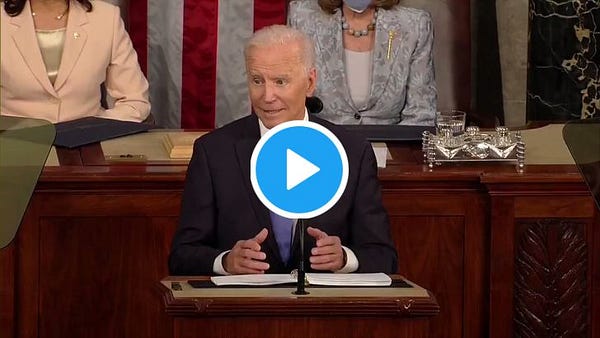Our New Polling Confirms What We Already Knew
Dispatches on the For The People Act (Edition #12)
Welcome to another edition of our For The People Act newsletter. Only two weeks until the Senate begins mark-up on the bill (May 11th).
Today we will spotlight an important but overlooked provision of the For The People Act: Ensuring voting access to Americans with disabilities.
But first a few important updates.
HUGE NEWS: In his Joint Address to Congress last night, President Biden called on the Senate to send the For The People Act and the John Lewis Voting Rights Act to his desk. The president using his bully pulpit to advance these bills is a major boost to our fight.


New polling: Earlier this week, we released a new poll with Data for Progress showing that, despite the onslaught of attacks and misinformation about H.R. 1 from billionaire dark money groups, the For The People Act remains incredibly popular. Here are the key findings:
62% of likely American voters support the For The People Act.
The bill receives strong majority support among Democrats (79%) and Independents (61%) and enjoys a plurality of support among Republicans (43%).
Contrary to Republican claims, support for the bill’s public financing provision remains strong at 56% of likely American voters.
Among those who support democracy reform, 64% prefer a comprehensive bill (so no, Americans do not want to break up the bill into narrow parts).
You can explore the full results here. And please share them!
In legislative news: Senate Majority Leader Schumer again emphasized his desire to move quickly on getting the For the People Act through the Senate. He stated that the deadline for the bill (i.e. the latest it could pass and still prevent the worst of voter suppression and gerrymandering) is August. The Majority Leader’s continued support for the For the People Act is very promising.
And this week on the podcast, Lessig spoke with Jimmy Wales, founder of Wikipedia and wt.social. Lessig and Wales discuss the origins of Wikipedia, its architecture, and its ad-free commitment to neutrality. They also attempt to unpack the growing polarization in the media, digital algorithms, the addictiveness of technology, and how to reform the informational ecosystem to ensure better deliberation. (Episode will be available here shortly).
Don’t forget to share our Substack with friends, family, and anyone else who you think might enjoy it!
Provision of the Week: Access to Voting for Individuals with Disabilities (Title I, Subtitle B)
What is it?
This provision, also called the Disability Voting Rights Act, protects ballot access for the more than 35.4 million Americans with disabilities who are eligible to vote. It would guarantee that anyone with a disability will be able to apply for and vote with an absentee ballot, an important protection since Americans with a disability are more likely to vote using absentee ballots than those without a disability. States would also be required to send voter registration forms and absentee ballots to voters with a disability by mail or electronically, with enough time allotted for these voters to fill out and return them. Eligible voters would be able to choose their preferred method of receiving the applications and absentee ballots.
In addition to protecting access to absentee ballots, the bill centralizes and streamlines accessibility by requiring that states designate one agency to be in charge of providing ballot access to those with disabilities. This agency must be reachable by email to register to vote, request an absentee ballot, or obtain information about voting. If a state cannot comply with the regulations in this provision, it can apply for a hardship waiver from the Attorney General, but the state still must ensure that individuals with disabilities have enough time to request and return their absentee ballots.
Finally, the bill would allocate grants via the Election Assistance Commission to states that conduct pilot programs with new technologies that increase accessibility (i.e. improve the processes for individuals with disabilities to register to vote and request and fill out their absentee ballots privately in their own homes.) And, at the end of every general election cycle, the Comptroller General of the United States would be required to conduct an audit of accessibility in elections, and submit the report to Congress.
Why does it matter?
The Americans with Disabilities Act of 1990 currently mandates that physical polling places must be accessible to all voters, regardless of disability status. However, according to data from the 2016 election, untrained poll workers, the use of paper ballots instead of electronic ballots, and poorly-managed accessible voting machines have produced impediments to voting for disabled individuals in nearly two-thirds of polling places.
Absentee ballots often pose serious accessibility challenges, too. Disability advocates estimate that around 40% of disabled voters use absentee ballots. But as one report released less than two months before the 2020 election found, 43 states had inaccessible absentee ballot applications. And absentee ballots that come on paper are not usable for some voters with cognitive, visual, or mobility disabilities. Americans with these disabilities either had to sacrifice the privacy of their votes by having an aide help fill out their ballot, or travel to a polling location and hope for a functional accessible voting machine (and, in 2020, no COVID contact).
By mandating that states provide electronic access to absentee ballots, the Disability Voting Rights Act takes the first step towards making absentee ballots an option for all. The review of voting access by the Comptroller General also paves the way for Congress to take further measures to protect the voting rights for the millions of Americans with disabilities.
If we don’t make the ability to vote accessible to all, we deny millions their civil rights. And in the long disability civil rights fight, voting access is an important step towards disability justice.
To learn more about the fight for ballot access for voters with disabilities, check out some of the voting rights work done by the National Disability Rights Network.
In the News:
Common Cause’s Joanne Antoine and Karen Hobert Flynn describe our “once-in-a-generation opportunity” to pass the For The People Act. The authors give a big shout-out to Rep. Sarbanes, who has played a central role in advancing the fight for the For The People Act and fair elections more broadly.
Washington Post columnist Jennifer Rubin recounts the lessons of the 2020 census and how they apply to democracy reform, including the For The People Act. Rubin suggests that the GOP’s attacks on democracy might hurt their own voters. She advocates for the passage of the For the People Act to protect voters on both sides of the aisle.
The Washington Post columnist Greg Sargent explored the difficult conversations that loom for Democrats. If Senate Democrats want to protect our democracy, Sargent argues that they must reform the filibuster to pass H.R. 1. We agree!
And now, a word from our (co)sponsors:
Now that the fight for H.R. 1 has become the fight for S. 1, we want to highlight and thank some key supporters in the Senate. Their advocacy for the For The People Act is crucial to its passage - and here we want to share their own words about why they support the bill!
“As California’s former chief elections officer, I was proud to strengthen election security and boost voter turnout by implementing the critical reforms contained in the For the People Act. They are proven, they are secure, and they should be available to all voters.” - Senator Padilla of California

“The For the People Act is landmark legislation to help restore our democracy, tackle dark money in politics, and make it easier for Americans to exercise their sacred right to vote… This legislation has been a priority of mine since it was first introduced, and I am hopeful that we can move this forward with the urgency that the American people deserve.” - Senator Luján of New Mexico

Social Media Roundup:
Let’s be frank: there are A LOT of tweets, posts, and general conversation about the For The People Act. In this section, we give you an overview of the tweets and media you really need to see.






How you can help:
One of our previous Substacks included 5 quick and easy ways to join the fight for H.R. 1! You can learn more about how to get involved here. In the meantime, you can:
Call your senators and tell them that you support reforming the filibuster to pass H.R. 1. You can find your senators’ phone numbers, as well as where they stand on the filibuster, using our handy filibuster tracker!
Write a letter to the editor in your local paper sharing your support of H.R. 1 and urging your Senators to pass it. Not sure how to write a letter to the editor? Reach out to us at info@equalcitizens.us and we can help!
Share our newsletter, our podcast, the articles included above, and the resources on H.R. 1 below on social media and tell your friends why you support #ForThePeopleAct
If you have questions about H.R. 1 you want us to answer in our Substack, tweet at us with #HR1Substack!
Extra, Extra:
If, after reading our newsletter, you still want to know more about the For The People Act, Equal Citizens, or the two of us, you can find more information here!
Relevant Resources:
Here are a few resources on the “For the People Act” if you have questions:
Equal Citizens recently launched a filibuster tracker, so you can see where your senator stands on the filibuster. It also includes their phone numbers and their Twitter handles, so you can get in touch with them directly and push them to support filibuster reform!
The Brennan Center for Justice created a wonderful guide to H.R. 1. Check it out here. They also created an in-depth report about racism and disenfranchisement due to incarceration.
Here is the link to the House website on the For the People Act.
Flood social media with these awesome graphics about the For the People Act!
There is a lot of misinformation about H.R. 1, and the amount of misinformation will only grow as the fight heats up. That’s why it’s more important than ever to make sure everyone has all the facts on the bill - here is an article from Media Matters that can help you fact check.
More about us:
Kate Travis is a fellow at Equal Citizens and a junior at Harvard studying History and Literature with a minor in Government. When she’s not fighting for democracy, you can find her running, playing the cello, and drinking copious amounts of coffee (maybe even all at once). Follow her on Twitter at @mkht930.
Kevin Rissmiller is a fellow at Equal Citizens and a Goodwin-Niering Scholar at Connecticut College majoring in Government and exploring sociology, economics, and applied statistics. In his free time, you will find him at Dunkins or (pre-pandemic) playing ultimate frisbee. Connect with him on LinkedIn.
If you want more updates on H.R. 1 from Kate and Kevin, then subscribe here!


